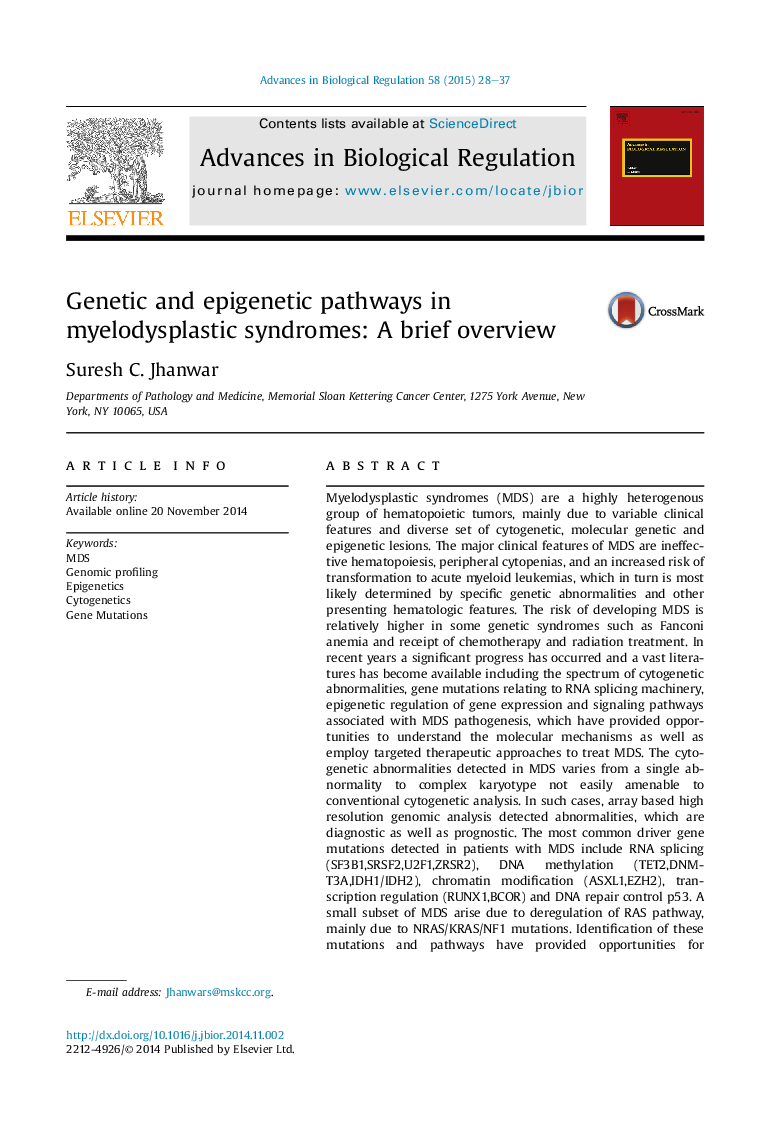| کد مقاله | کد نشریه | سال انتشار | مقاله انگلیسی | نسخه تمام متن |
|---|---|---|---|---|
| 1924495 | 1535873 | 2015 | 10 صفحه PDF | دانلود رایگان |
عنوان انگلیسی مقاله ISI
Genetic and epigenetic pathways in myelodysplastic syndromes: A brief overview
ترجمه فارسی عنوان
مسیرهای ژنتیکی و اپی ژنتیکی در سندرم های میلولد پلاسمی: یک مرور کلی
دانلود مقاله + سفارش ترجمه
دانلود مقاله ISI انگلیسی
رایگان برای ایرانیان
کلمات کلیدی
موضوعات مرتبط
علوم زیستی و بیوفناوری
بیوشیمی، ژنتیک و زیست شناسی مولکولی
زیست شیمی
چکیده انگلیسی
Myelodysplastic syndromes (MDS) are a highly heterogenous group of hematopoietic tumors, mainly due to variable clinical features and diverse set of cytogenetic, molecular genetic and epigenetic lesions. The major clinical features of MDS are ineffective hematopoiesis, peripheral cytopenias, and an increased risk of transformation to acute myeloid leukemias, which in turn is most likely determined by specific genetic abnormalities and other presenting hematologic features. The risk of developing MDS is relatively higher in some genetic syndromes such as Fanconi anemia and receipt of chemotherapy and radiation treatment. In recent years a significant progress has occurred and a vast literatures has become available including the spectrum of cytogenetic abnormalities, gene mutations relating to RNA splicing machinery, epigenetic regulation of gene expression and signaling pathways associated with MDS pathogenesis, which have provided opportunities to understand the molecular mechanisms as well as employ targeted therapeutic approaches to treat MDS. The cytogenetic abnormalities detected in MDS varies from a single abnormality to complex karyotype not easily amenable to conventional cytogenetic analysis. In such cases, array based high resolution genomic analysis detected abnormalities, which are diagnostic as well as prognostic. The most common driver gene mutations detected in patients with MDS include RNA splicing (SF3B1,SRSF2,U2F1,ZRSR2), DNA methylation (TET2,DNMT3A,IDH1/IDH2), chromatin modification (ASXL1,EZH2), transcription regulation (RUNX1,BCOR) and DNA repair control p53. A small subset of MDS arise due to deregulation of RAS pathway, mainly due to NRAS/KRAS/NF1 mutations. Identification of these mutations and pathways have provided opportunities for oncologists to target these patients with specific therapies. Several drugs which either target the spliceosome, oncogenic RAS signaling, or hypomethylating agents have been employed to successfully treat MDS patients.
ناشر
Database: Elsevier - ScienceDirect (ساینس دایرکت)
Journal: Advances in Biological Regulation - Volume 58, May 2015, Pages 28-37
Journal: Advances in Biological Regulation - Volume 58, May 2015, Pages 28-37
نویسندگان
Suresh C. Jhanwar,
